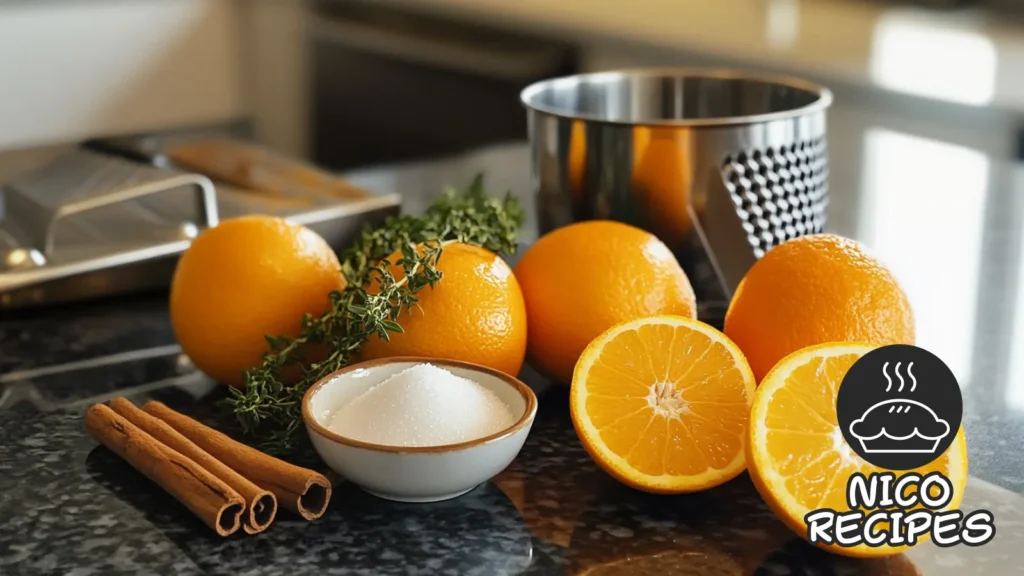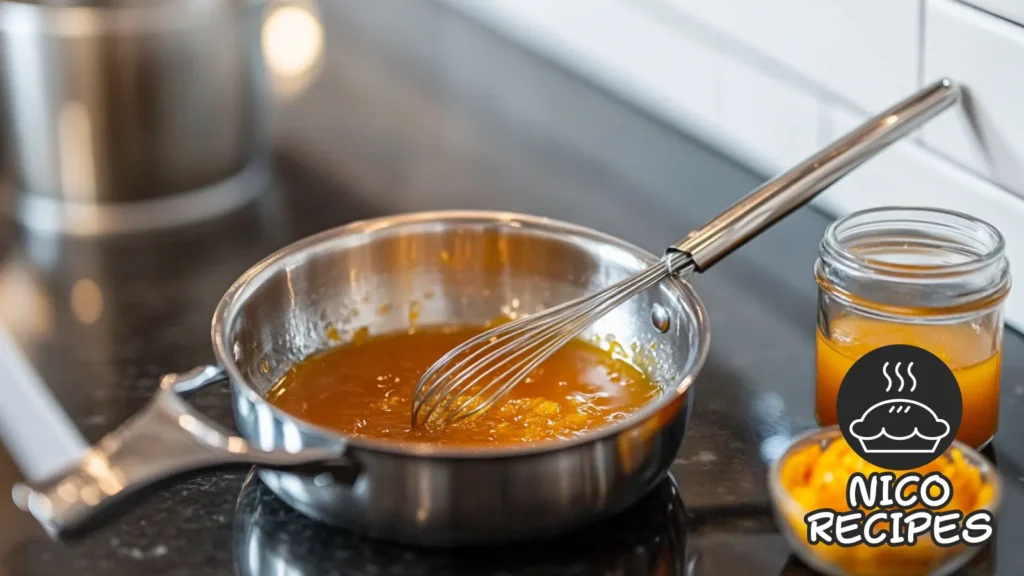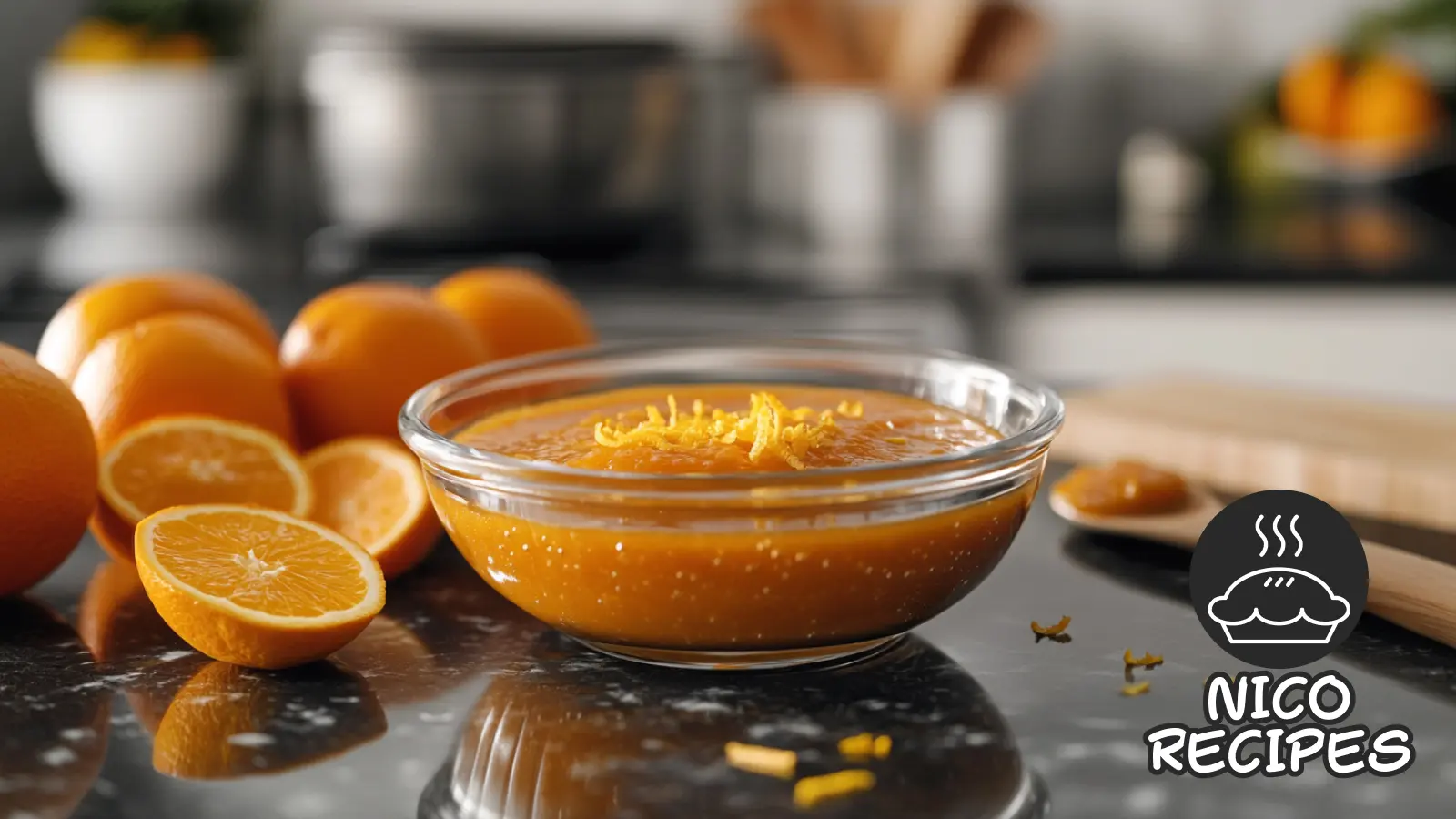Introduction to Orange Sauce
Orange sauce is a versatile and flavorful addition that can elevate a variety of dishes, from savory mains to sweet desserts. Its vibrant color and tangy-sweet profile make it an instant crowd-pleaser, whether you’re serving it as a glaze for roasted meats, a dip for appetizers, or a drizzle over a luscious dessert. The magic lies in its ability to adapt to different cuisines and flavor preferences, offering endless possibilities.
Rooted in culinary traditions from around the world, orange sauce can be crafted with a simple list of ingredients. From zesty Mexican orange sauce to rich orange BBQ sauce or orange barbecue sauce, its variations are as exciting as its uses. With a little creativity, you can create a sauce that perfectly suits your taste buds and complements your meal.
Whether you’re an experienced cook or just starting in the kitchen, this guide will help you master the art of making orange sauce. Let’s dive into the ingredients and techniques that will make this sauce your new favorite condiment!
Ingredients for Orange Sauce
Creating a delicious sauce starts with choosing the right ingredients. Each component plays a vital role in achieving the perfect balance of flavor, texture, and aroma. Let’s break down the essentials and explore some optional additions for a personalized touch.

Fresh Oranges: The Star Ingredient
At the heart of any great orange sauce are fresh oranges. Their vibrant zest and juicy pulp provide the base for this flavorful sauce. For the best results, opt for sweet, ripe oranges with a bright orange peel. Navel oranges are a popular choice, but feel free to experiment with blood oranges or mandarins for a unique twist.
Sweeteners: Sugar, Honey, or Alternatives
To balance the natural tanginess of oranges, a touch of sweetness is essential. Granulated sugar is a classic option, but honey or maple syrup can add depth and complexity to the flavor. For a healthier twist, consider natural sweeteners like agave or stevia.
Enhancing Flavors: Spices and Herbs
A pinch of spices can elevate your sauce from simple to extraordinary. Cinnamon, ginger, or cloves can add warmth and richness, while fresh herbs like thyme or rosemary lend an aromatic touch. These additions create layers of flavor that make the sauce unforgettable.
Optional Additions for Unique Twists
Looking to customize your orange sauce? Try incorporating a splash of orange liqueur for a boozy kick or a hint of soy sauce for a savory profile. A dash of chili flakes or hot sauce can introduce a spicy element, perfect for those who enjoy a bit of heat. The possibilities are endless, so don’t be afraid to experiment!
Step-by-Step Preparation Process
Crafting orange sauce is a straightforward process that combines simple techniques with a touch of creativity. Follow these steps to create a perfectly balanced and flavorful sauce that will elevate any dish.

Preparing the Oranges
Start by selecting fresh, ripe oranges. Wash them thoroughly to remove any wax or dirt, as you’ll be using both the zest and juice. Use a fine grater or zester to collect the vibrant orange zest—this adds a concentrated burst of flavor. Next, cut the oranges in half and juice them, ensuring you remove any seeds. If you prefer a pulp-free sauce, strain the juice through a fine mesh sieve.
Mixing the Ingredients
In a medium-sized mixing bowl, combine the freshly squeezed orange juice and zest with your chosen sweetener—sugar, honey, or an alternative. Add any desired spices or herbs, such as cinnamon, ginger, or thyme, to enhance the flavor. Stir the mixture until the sweetener dissolves completely.
Cooking and Adjusting Consistency
Transfer the mixture to a saucepan and place it over medium heat. Allow the sauce to simmer gently, stirring occasionally to prevent sticking. As the liquid reduces, it will thicken naturally. For a smoother and thicker consistency, you can dissolve a small amount of cornstarch in water and whisk it into the sauce.
Taste and adjust as needed—add a pinch more sugar for sweetness, a splash of lemon juice for acidity, or a sprinkle of spice for depth. Once the sauce reaches your desired consistency, remove it from the heat and let it cool slightly before serving.
Variations of Orange Sauce
One of the best things about this sauce is its adaptability. By tweaking ingredients and proportions, you can create unique versions that cater to different culinary needs. Here are some popular variations to inspire your creativity.
Sweet Orange Sauce
For desserts or breakfast treats, a sweet orange sauce is a delightful choice. Simply increase the amount of sugar or honey in the recipe and add a touch of vanilla extract. This version pairs beautifully with pancakes, waffles, or even ice cream. For extra flair, consider adding a splash of orange liqueur like Grand Marnier.
Savory Orange Sauce
Savory orange sauce is perfect for glazing meats like chicken, duck, or pork. Reduce the sweetness and add savory elements like soy sauce, garlic, and a hint of ginger. This version works wonderfully in Asian-inspired dishes or as a marinade for roasted or grilled proteins.
Spicy Orange Sauce
If you enjoy a kick of heat, spicy orange sauce is a must-try. Incorporate ingredients like chili flakes, sriracha, or cayenne pepper to add a fiery edge. This variation makes a fantastic dip for fried appetizers or a bold dressing for salads and wraps.
Serving Suggestions
Orange sauce’s versatility makes it a fantastic companion for a variety of dishes. Whether you’re adding a burst of flavor to your mains or using it as a dip, this sauce can transform your meal into a culinary masterpiece. For a unique twist, try pairing it with desserts like our Brown Butter Banana Bread to elevate the flavors with a citrusy touch.
Pairing with Main Dishes
Orange sauce shines as a glaze for roasted or grilled meats. Brush it over chicken, duck, pork, or even salmon during the final stages of cooking for a glossy finish and a tangy-sweet flavor. It also works well in stir-fry dishes, where it can coat vegetables and proteins to create a harmonious blend of flavors.
For a plant-based option, drizzle the sauce over roasted vegetables like carrots, sweet potatoes, or Brussels sprouts. It also complements tofu or tempeh, adding depth and brightness to vegetarian meals.
Using as a Dip or Dressing
Orange sauce is an excellent choice as a dipping sauce for appetizers such as spring rolls, chicken tenders, or fried shrimp. Its vibrant flavor makes it a standout addition to party platters and snack boards.
Alternatively, thin the sauce slightly with olive oil or vinegar to create a zesty dressing for salads. It pairs especially well with leafy greens, fresh fruits, and nuts, adding a burst of citrusy goodness to every bite.
Tips and Tricks for Perfect Orange Sauce
Creating an impeccable orange sauce takes a bit of know-how. These tips and tricks will help you achieve a sauce that’s not only delicious but also perfectly balanced in flavor and texture. If you’re looking for another unique recipe, check out our guide on making the Oatmeal Cookie Shot for a fun and flavorful drink idea.
Achieving the Right Texture
The texture of your orange sauce can make or break its appeal. For a smooth and silky consistency, ensure you strain the orange juice to remove pulp and seeds. If you prefer a thicker sauce, consider adding a cornstarch slurry (a mix of cornstarch and water) while simmering. Stir constantly to avoid lumps and cook just until the sauce reaches the desired thickness.
Balancing Sweetness and Acidity
Striking the perfect balance between sweetness and acidity is key to a great orange sauce. If your sauce tastes too tart, add a touch more sugar or honey. Conversely, if it’s too sweet, a squeeze of lemon or lime juice can restore harmony. Always taste and adjust as you go, keeping in mind that the sauce’s flavor will intensify as it reduces.
Common Mistakes and How to Avoid Them
Even with a straightforward recipe, a few common pitfalls can hinder your orange sauce’s success. Here are the most frequent mistakes and how to steer clear of them.
Overcooking the Sauce
Overcooking is a common mistake that can lead to a bitter or overly thick sauce. Orange juice contains natural sugars that can caramelize and burn if cooked at too high a heat or for too long. To avoid this, simmer the sauce over medium or low heat and monitor it closely. Remove it from the heat as soon as it reaches your desired consistency.
Using Low-Quality Oranges
The flavor of your orange sauce hinges on the quality of your oranges. Using bland or unripe fruit will result in a lackluster sauce. Always opt for fresh, juicy, and aromatic oranges. If fresh oranges are unavailable, high-quality bottled orange juice can be a suitable alternative, but ensure it’s free from added sugars or preservatives.
Frequently Asked Questions
Orange sauce often raises questions, especially for those exploring it for the first time. Let’s address some of the most common queries to ensure you feel confident in making and using this versatile condiment.
What is orange sauce made of?
Orange sauce typically consists of fresh orange juice, orange zest, a sweetener like sugar or honey, and optional flavor enhancers such as spices, herbs, or a thickening agent. These simple ingredients come together to create a tangy-sweet sauce perfect for various dishes.
Is orange sauce the same as duck sauce?
No, orange sauce and duck sauce are not the same. While both are sweet sauces, duck sauce often includes ingredients like apricots, plums, or peaches and is commonly used in Chinese cuisine as a condiment for fried appetizers. Orange sauce, on the other hand, is citrus-based and more versatile in its applications.
Is orange sauce the same as sweet and sour?
Not exactly. Orange sauce is primarily citrus-based, focusing on the bright and tangy flavor of oranges, while sweet and sour sauce balances a combination of vinegar and sugar, often with ketchup or soy sauce for additional depth. Both are delicious but distinct in their flavor profiles and uses.
Can you buy orange sauce already made?
Yes, pre-made orange sauce is available in most grocery stores, often in the condiment or international foods aisle. However, making it from scratch allows you to customize the flavor and control the ingredients, ensuring a fresher and healthier version.
Conclusion
Orange sauce is a delightful and versatile addition to your culinary repertoire. Whether you’re drizzling it over a savory dish, using it as a dip, or adding it to a dessert, this sauce brings a burst of citrusy freshness to every bite. Its adaptability allows you to experiment with different flavors, from sweet and tangy to spicy or savory, making it a go-to recipe for any occasion.
By mastering the simple techniques outlined in this guide, you can create a sauce that’s perfectly tailored to your taste. Remember to use high-quality ingredients, balance the flavors, and let your creativity shine through. With these tips and variations, your homemade orange sauce is sure to impress at your next meal.
So, why wait? Gather your ingredients, roll up your sleeves, and bring a splash of sunshine to your table with this vibrant orange sauce. Bon appétit!


